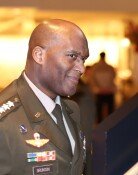The U.S. Examines Alternative Attack Route into Iraq
The U.S. Examines Alternative Attack Route into Iraq
Posted March. 03, 2003 22:34,
The Washington Post reported on Sunday that the U.S. Department of Defense is examining `Plan B` as an alternative after the its attack route from the northern front of Iraq was cut off due to the Turkey Parliament`s rejection of additional ground troops in that country.
Under `Plan B`, the U.S. will have to bear the burden of high cost and inconvenience by having to execute its offensive from Kuwait or other regions in the Persian Gulf to the northern front line of Iraq. This would inevitably entail the U.S. having to send its army across hundreds of kilometers of Kuwaiti desert.
However, the New York Times reported today that Yasar Yakis, foreign minister of Turkey clarified on the 2nd, “My government would bring a new resolution to Parliament later this week after the government completes an assessment of the first vote.” Moreover, a government official from the Department of Defense anonymously clarified that General Tommy Franks, Commander in Chief of the U.S. Central Command, has not yet given up on Turkey.
Meanwhile, the Washington Post reported that all forces under the command of General Franks have completed the necessary preparations for war and are waiting the order for attack from the Supreme Commander, President George W. Bush.
The current total number of allied forces in Kuwait numbers 140,000 soldiers: 11,100 from the United States and another 2,800 from Britain. Thus, the U.S. military arsenal in the Gulf has reached its climax. Military analysts predict the attack will most likely be executed in the middle or end of March.
Specific plans for management of Iraq after the war are being discussed. In a recent edition of the NY Times (dated February 10th) reported that Jay Garner, chief of the Office of Reconstruction and Humanitarian Assistance who is also a retired US lieutenant general as well as friend of Donald Rumsfeld, Secretary of Defense, will be in charge of the Iraq`s civil administration after the war.
The Wall Street Journal also reported today that there is a `petroleum energy policy group` who will present the direction for petroleum policy within a working panel supported by the U.S. State Department to assist in the policy decisions of the new Iraqi regime.
President Saddam Hussein of Iraq, who is accelerating his cooperation with UN Weapon Inspectors, has received a report on his country`s defense from commanders of mechanized infantry units as well as tank brigades today.
Hye-Yoon Park parkhyey@donga.com







